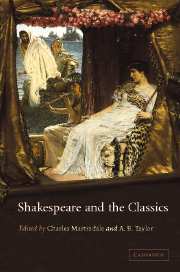Book contents
- Frontmatter
- Contents
- Notes on contributors
- List of abbreviations
- Introduction
- PART I AN INITIAL PERSPECTIVE
- PART II ‘SMALL LATINE’
- 2 Petruchio is ‘Kated’: The Taming of the Shrew and Ovid
- 3 Ovid's myths and the unsmooth course of love in A Midsummer Night's Dream
- 4 Shakespeare's learned heroines in Ovid's schoolroom
- 5 Shakespeare and Virgil
- 6 Shakespeare's reception of Plautus reconsidered
- 7 Shakespeare, Plautus, and the discovery of New Comic space
- 8 ‘Confusion now hath made his masterpiece’: Senecan resonances in Macbeth
- 9 ‘These are the only men’: Seneca and monopoly in Hamlet 2.2
- PART III ‘LESSE GREEK’
- PART IV THE RECEPTION OF SHAKESPEARE'S CLASSICISM
- Select bibliography (compiled by Joanna Paul)
- Index
2 - Petruchio is ‘Kated’: The Taming of the Shrew and Ovid
Published online by Cambridge University Press: 22 September 2009
- Frontmatter
- Contents
- Notes on contributors
- List of abbreviations
- Introduction
- PART I AN INITIAL PERSPECTIVE
- PART II ‘SMALL LATINE’
- 2 Petruchio is ‘Kated’: The Taming of the Shrew and Ovid
- 3 Ovid's myths and the unsmooth course of love in A Midsummer Night's Dream
- 4 Shakespeare's learned heroines in Ovid's schoolroom
- 5 Shakespeare and Virgil
- 6 Shakespeare's reception of Plautus reconsidered
- 7 Shakespeare, Plautus, and the discovery of New Comic space
- 8 ‘Confusion now hath made his masterpiece’: Senecan resonances in Macbeth
- 9 ‘These are the only men’: Seneca and monopoly in Hamlet 2.2
- PART III ‘LESSE GREEK’
- PART IV THE RECEPTION OF SHAKESPEARE'S CLASSICISM
- Select bibliography (compiled by Joanna Paul)
- Index
Summary
How does the assertion that The Taming of the Shrew contains allusions to Ovid add to its interest or enliven our engagement with it? This question should be held in mind continuously when thinking about how to characterise Shakespeare's sources for his play. We are aware by now that to describe any play as Ovidian is to open up and not close down interpretative possibilities, and the relationship between Shakespeare and Ovid has been too thoroughly explored for there to be much to be gained from reference spotting. If we work within the particular area of literary criticism that is concerned to construct a classical tradition, more is required of us than to identify possible intertextualities in order to establish contexts for the interpretation of particular words. Part of our project must surely be to continue to think about the kind of Ovid Shakespeare himself creates and to allow that creation to impact on our readings both of Shakespeare and of Ovid.
When it comes to The Taming of the Shrew, one of the challenges for the critic is how to write about a play that dramatises the process of control and subjugation of a woman without seeming to collude in it. The unease that is triggered by Kate's final speech is made evident by the strategies adopted by both critics and performers to explain it: these include references to irony or to humour or, most prevalently, to history.
- Type
- Chapter
- Information
- Shakespeare and the Classics , pp. 31 - 48Publisher: Cambridge University PressPrint publication year: 2004



